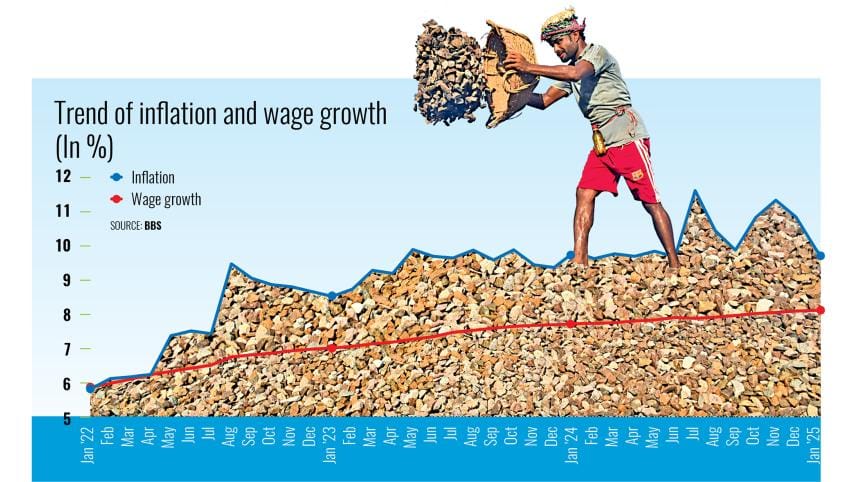Wage growth negative for 3 years as inflation outpaces pay rise

Stubbornly high price pressures have kept real wage growth negative for three consecutive years, forcing low-income households to cut back on protein consumption and brace for food insecurity.
Inflation has outpaced wage growth for 36 consecutive months up to January, despite a gradual increase in pay gains since January 2021, according to the Bangladesh Bureau of Statistics (BBS).
The wage growth rate stood at 8.16 percent in January, 1.78 percentage points below the inflation rate of 9.94 percent that month, as per the BBS Wage Rate Index (WRI).
The widest gap between inflation and wage growth was in July last year, at 3.73 percentage points.
Economists say this widening disparity has forced low-income and unskilled workers to reduce food consumption due to declining real incomes.
A recent report by the Food and Agriculture Organization of the United Nations (FAO) on Bangladesh supports the assertion.
The FAO said that the number of people in Bangladesh facing high levels of acute food insecurity increased by 70 lakh to 2.36 crore in December last year, compared to 1.65 crore during the April-October period of 2024.
"The widening gap has been pushing low and limited-income groups to the brink for years," said Mohammad Lutfor Rahman, a professor of economics department at Jahangirnagar University.
"Prolonged high inflation will inevitably erode people's purchasing power and change their food consumption habits," he added.
In January, the overall food inflation was 10.72 percent, down from 12.92 percent in December 2023.
Food inflation has remained above 9 percent since May 2023 and crossed 9.5 percent in every month of fiscal year (FY) 2023-24 except for February and June.
However, in urban areas, food inflation reached 14.63 percent in November, disproportionately affecting the urban poor.
Echoing Rahman's views, Prof Selim Raihan, executive director of the South Asian Network on Economic Modeling (Sanem), said declining real wages force people to reduce protein intake and opt for lower-quality food.
"Responding to high inflation, people would initially cut back on non-food expenses such as entertainment and clothing. If that is not enough, they would start reducing their food consumption," he said.
"Eventually, they start skipping nutritious foods and opt for cheaper, lower-quality alternatives," added the economist.
In January, wage growth in the agriculture sector was 8.41 percent, up by 0.04 percentage points from December. Wage growth in the industrial sector increased by 0.03 percentage points to 7.80 percent, while the service sector saw a 0.01 percentage point rise to 8.44 percent.
The Wage Rate Index, or WRI, tracks the wages of informal workers paid daily across 63 occupations in the agriculture, industry and service sectors.
To tame the stubbornly high inflation, Prof Rahman urged the interim government to implement coordinated measures, including fiscal and monetary policies.
"The government must strengthen its monitoring mechanisms to reduce the influence of middlemen in market management," he said.
A study by the private think tank Research and Policy Integration for Development (RAPID) found that real income reductions caused by inflationary pressure over the past two years have pushed at least 78 lakh people into poverty, including 38 lakh who have fallen into extreme poverty.
Besides, another 1 crore people are at risk of falling below the poverty line due to continued inflationary pressures, the study said.
Against the backdrop, Finance Adviser Salehuddin Ahmed said on Tuesday that inflation is expected to decline to a tolerable level within the next three months.
"We will take several measures in February, March and April to curb inflation," said the adviser. "If inflation can be brought down to 6 percent to 7 percent by June, the interim government will consider it satisfactory."
However, Prof Raihan expressed skepticism about the feasibility of this goal.
He said, "I want to be optimistic, but I doubt whether there are enough reasons to be hopeful about a remarkable drop in the price pressure."
"We are now witnessing a price drop in some food items, including vegetables. However, rice prices are still high," he said.




 For all latest news, follow The Daily Star's Google News channel.
For all latest news, follow The Daily Star's Google News channel.
Comments